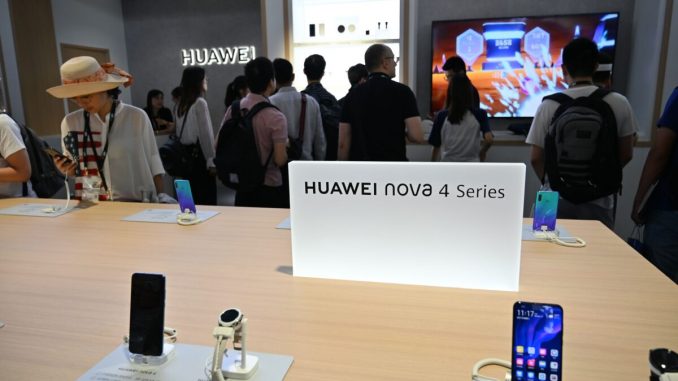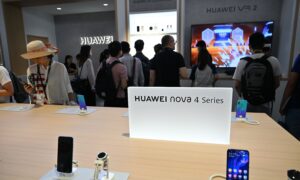

China’s telecom Huawei has been hit by four rounds of U.S. sanctions in less than two years. After nearly eight months of chip shortages, Huawei’s smartphone business has been battered, forcing it to expand into “crossover” businesses, such as smart pig farming, mining, and car sales.
On May 4, Bonjour Holdings Limited, one of Hong Kong’s leading cosmetics retailers, signed a cooperation agreement with Huawei International Co. Ltd. in Hong Kong, for joint brand marketing in another Huawei “crossover” business venture.
The announcement said that Bonjour Technology Services Limited, a wholly-owned subsidiary, had entered into a non-binding memorandum of understanding with Huawei’s subsidiary, Huawei International Co. Ltd. in Hong Kong, to conduct co-brand sales.
The specific cooperation between the two parties outlines that Huawei Hong Kong will build smart retail stores and provide technical support for Bonjour through big data analysis, electronic payment, Wifi6, and other technology solutions.
US Sanctions Against Huawei and Affiliates
Late last month, Huawei’s consumer business CEO Yu Chengdong said that in a short span of less than two years, the United States had imposed four rounds of sanctions on Huawei. As a result, Huawei lost its high-end domestic market to Apple, its middle and low-end domestic market to Oppo, Vivo, and Xiaomi, and its overseas market to Apple, Samsung, and other Chinese brands.
In May 2019, the Trump administration issued its first ban against Huawei. The Commerce Department announced that Huawei and 68 affiliated companies had been placed on the Bureau of Industry and Security’s (BIS) Entity List of Export Control. Before importing American parts, Huawei must first obtain the approval of BIS; otherwise, American companies cannot sell or transfer technology or products to Huawei.
In August 2019, forty-six Huawei affiliates were added to the entity list.
On May 15, 2020, the Department of Commerce announced that it would further cut Huawei and its affiliates off the global chip supply chain through the newly revised Foreign Produced Direct Product Rule.
On Aug. 17, 2020, the Department of Commerce added another 38 non-U.S. affiliates of Huawei to the entity list, which took effect immediately, in order to prevent Huawei from circumventing the U.S. export ban through third-party companies. This brought the total number of Huawei affiliates on the Entity List to 152.
After a 120-day grace period following the announcement of the ban on Sept. 14, 2020, companies selling semiconductor products containing U.S. technology to Huawei had to first obtain an export license from the U.S. government, leaving Huawei facing great difficulty obtaining chips from commercial sources.
The rules explicitly state that at any stage of the deal, anyone using American software or American-made products must obtain a license from the U.S. Commerce Department to sell chips to Huawei.
The impact on the industry was immediate. TSMC (Taiwan Semiconductor Manufacturing Company), Intel, Qualcomm, MediaTek, Micron, and other chip manufacturers announced that they would stop selling products to Huawei after Sept. 15. Even SMIC, a Chinese chip foundry, has euphemistically said it would “absolutely abide by international regulations.”
Sales of Huawei Phones Have Plummeted
After the Trump administration imposed sanctions on Huawei in May 2019, Google stopped upgrading Huawei’s Android operating system, which hampered Huawei’s smartphone operations in overseas markets. After that, Huawei’s two most profitable projects, smartphones and 5G networks, were hit hard when the United States cut off global supply of high-end chips to the company.
Canalys, an international market research firm, released its China Smartphone Market Report for the first quarter of 2021 on April 29. According to the report, smartphone shipments by Huawei fell to 14.9 million in the first quarter—a 50 percent drop from last year.
In the global mobile phone market, Huawei dropped out from the global top five in the first quarter of 2021, and was replaced by Samsung, Apple, Xiaomi, Oppo, and Vivo, according to data released by international data firm IDC on April 28.
On March 31, Huawei released its 2020 annual report.
“Last year was not easy for Huawei,” Hu Houkun, Huawei’s rotating chairman, admitted when answering questions from Chinese state media. He said that U.S. sanctions had a direct impact on Huawei’s operations and “had a very big impact on the consumer business, especially on mobile products.”
On April 28, Huawei announced its operating results for the first quarter of 2021. Revenue had fallen 16.5 percent year on year to 152.2 billion yuan ($23.66 billion), according to the statement. It was Huawei’s second straight quarter of declining revenue.
Huawei Forced to Mine, Raise Pigs, Sell Cars
Facing a survival crisis, Huawei has had to find new ventures to keep going.
In February, Huawei launched a smart mining project in Shanxi Province. Ren Zhengfei, Huawei’s founder and CEO, said the company can survive without its phone productions.
Shortly after the news broke, Duan Aiguo, president of Huawei’s machine vision business, said in a post on Weibo that Huawei will enter the smart pig farming industry and provide smart technology. This pig farming system provides dashboard monitoring, big data analysis, digital management, AI recognition, AI learning, AI prediction, AI decision-making, to realize full sensing monitoring, robot inspection, and remote control.
Next, Huawei became a competitor to WeChat Pay and Alipay when it obtained a payment license through purchasing 100 percent equity of the Sharelink Network in March.
And on April 17, Huawei unveiled its first intelligent luxury all-electric car in Shanghai.
Huawei Is a Tool of the CCP
The FBI once said that Huawei, despite being a private company, receives resources and funding from the Chinese Communist Party (CCP). Huawei has been promoted by the Chinese government as a “national champion” business, an honorary designation usually given exclusively to state-owned entities. This indicates that the conglomerate, which makes routers, mobile phones, and other equipment, is a key element of China’s CCP-led economic policy, including access to foreign technology, i.e. theft of foreign intellectual property.
Former U.S. Secretary of State Mike Pompeo also said in a statement last May that “Huawei is an untrustworthy vendor and a tool of the Chinese Communist Party, beholden to its orders.”
In June of last year, Huawei was formally added to the Pentagon’s list of companies operating in the United States that receive support from the CCP’s military.





Be the first to comment